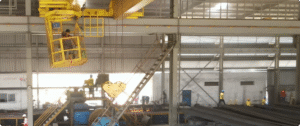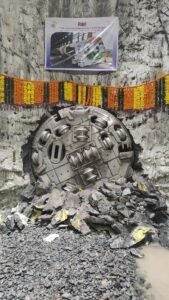Greater Noida (Hridaya Mohan, hridayamohan@yahoo.co.in): The UK government has passed an emergency law to prevent the shutdown of the last integrated steel plant in the country that can produce steel from raw materials rather than recycled scrap. The government has taken control of the Chinese-owned British Steel’s plant in Scunthorpe, Lincolnshire, in the Eastern Midlands region of England, after it was put at risk of imminent closure.
In an unusual and dramatic move, both the houses of Parliament were called on Saturday by Prime Minister Keir Starmer to vote on granting the government control of British Steel, as emergency legislation paving the way for the company’s nationalization in order to keep its two blast furnaces operating. MPs and peers were on their Easter break and were not due to return until 22 April. “Steel is fundamental to Britain’s industrial strength, to our security and to our identity as a primary global power,” Jonathan Reynolds, the business and trade secretary, told Parliament on Saturday in introducing the legislation. MPs approved the Steel Industry (Special Measures) Bill without any resistance.
Prime Minister Keir Starmer said the government had to act quickly to stop the blast furnaces from being turned off and protect what remains of the UK’s steel-making capabilities. Speaking to steelworkers in a nearby village hall, he said the move was “in the national interest.”
Parliament sat on both Saturday and Sunday on the outbreak of World War Two in 1939. And there have been only five occasions since then when it sat on a Saturday, showing the importance the government is placing on the law.
Speaking at Downing Street on Friday, Sir Keir said the government wanted to pass the legislation in a single day, adding the future of the company “hangs in the balance”. He said steelmaking was “essential for our future” and that he would always “act in the national interest to protect British jobs and British workers”. “Jobs, investment, growth, our economic and national security are all on the line,” the prime minister said.
British Steel’s plant in Scunthorpe, employs 2,700 people, about three-quarters of the company’s entire workforce. Were the plant to cease producing virgin steel, the UK would become the only member of the G7 group of leading economies without the ability to make it – a prospect the government views as a risk to the country’s long-term economic security.
The company was founded in 2016 when Tata Steel sold its loss-making long products division in Scunthorpe to private investment firm Greybull Capital for a token £1. The new owners renamed the business British Steel. Following a period of financial instability, British Steel was taken over by the government’s insolvency service in 2019 and then acquired by Chinese steel-making firm Jingye the following year. Jingye claims to have invested over £1.2 billion to keep it running.
In late March 2025, Jingye said the plant was losing around £700,000 a day and is no longer financially viable. They launched a consultation on its closure. The government held talks with Jingye aimed at keeping the plant operational. After these appeared to have largely broken down, emergency legislation was fast-tracked through Parliament in a single day on Saturday – handing control of the plant to the government.
Reynolds said that Jingye wanted to supply the plant with slab steel from China instead of continuing full operations in the UK. He also revealed that the firm asked the government to hand over “hundreds of millions of pounds” without restrictions and refused a condition to keep the blast furnaces in working condition. According to Reynolds, “the effective market value of this company is zero.”
Jingye still owns the site, but the business secretary now has sweeping powers to control management and workers to make sure production continues. This means British Steel has not been nationalised – which is when a government takes ownership and control of a company. But Business Secretary Jonathan Reynolds acknowledged that public ownership was “the likely option”. While the government hopes to secure private investment to save the plant, ministers admit there are currently no companies willing to buy it.
British Steel traces its roots back to the Industrial Revolution, but it was formally established in 1967 when the Labour government nationalised the industry. At the time, nearly 2,70,000 people worked in the sector. The Scunthorpe plant has stood through many changes, but Saturday’s emergency law may decide whether it remains part of Britain’s future.
About the Author

Mr. Hridaya Mohan is a regular Columnist with a renowned Indian daily “The Hitavada” and some other newspapers / magazines internationally. Superannuated as Executive Director, Steel Authority of India Ltd. (SAIL), he is Senior Adviser, Metallon Holdings Pvt. Ltd. presently. He headed SAIL office at Beijing as Chief Representative (China & Mongolia) for six years. He has published and presented seventeen papers globally. Recipient of “Sir M Visvesvaraya Gold Medal” for one of his papers, “Benchmarking of Maintenance Practices in Steel Industry” from The Institution of Engineers (India), he was awarded with “Scroll of Honour” for the excellent contributions to Engineering fraternity from IE(I), Bhilai, “Jawahar Award” for leadership excellence in SAIL and “Supply Chain Leader – 2017” award from IIMM.









